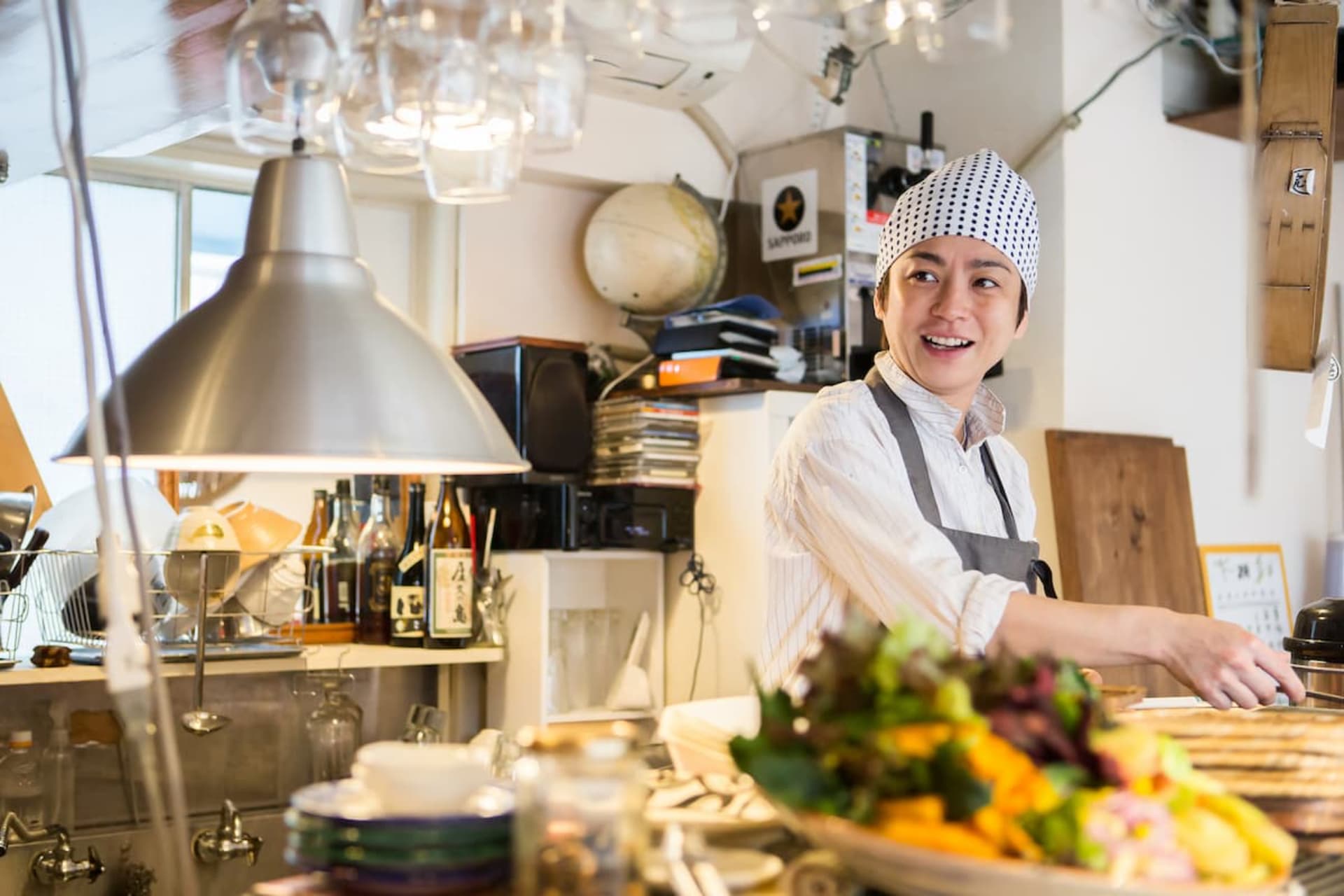How culinary entrepreneurship can help you reach your dreams

With more than 700,000 restaurants in the US and many more cafes, bakeries and other food businesses, the path to entrepreneurial success in the food industry has never been more accessible or enticing. For many aspiring chefs, bakers and gastronomy enthusiasts, moving from kitchen to marketplace represents more than just a career change; it’s a pursuit of passion, innovation and personal fulfillment. This article explores how culinary entrepreneurship can transform dreams into reality, offering insights into the opportunities, challenges and rewards of building a food-centric business.
What types of culinary businesses are there?
Food and beverage entrepreneurship offers diverse opportunities for passionate culinary enthusiasts to turn their skills into successful ventures. Some of the most common businesses people start are:
-
Restaurants and cafés: from fine dining to themed diners, entrepreneurs create memorable eating experiences
-
Food trucks and street stalls: mobile businesses with flexible menus capitalize on trends and high-traffic locations, offering variety and excitement
-
Catering services: providing customized menus for weddings, corporate events and parties
-
Bakeries and confectioneries: specializing in baked goods, pastries and desserts for stand-alone shops, online stores or wholesale
-
Specialty food products: creating and selling unique sauces, spices and packaged meals through online platforms or retail partnerships
-
Cooking classes and workshops: teaching culinary skills through in-person or virtual classes, appealing to aspiring chefs and food enthusiasts
-
Personal chef services: offering personalized meal preparation, catering to clients' dietary needs and preferences

Benefits of culinary entrepreneurship
Setting your own path in this industry offers personal and professional rewards that can be deeply fulfilling. Whether you're drawn to the creativity of crafting new dishes or the excitement of running an active business, there are plenty of reasons to consider becoming an entrepreneur. Let’s look at some of the key advantages.
Creative freedom
Culinary entrepreneurship allows you to express your creativity through food. Whether developing innovative recipes, designing a unique menu or creating an appealing ambiance, you have the freedom to bring your vision to life. This creative control can be incredibly satisfying for those passionate about the cooking arts.
Personal fulfillment
Turning a passion for cooking into a business can lead to profound satisfaction. Seeing your culinary creations appreciated by customers, receiving positive feedback and building a loyal clientele can be immensely rewarding. This sense of accomplishment frequently drives entrepreneurs to continually improve and innovate.
Financial independence
Owning a culinary business offers the potential to be financially independent. With hard work and smart management, you can build a profitable venture that provides a steady income and financial security. Successful food-based companies can also generate substantial profits and opportunities for expansion.
Flexibility and autonomy
As a culinary entrepreneur, you have the freedom to make your own decisions about your business. This includes setting your hours, choosing your work environment and deciding on your company’s direction. This flexibility can lead to a better work-life balance and a more satisfying professional life.
Community engagement
Culinary businesses often become integral parts of their surroundings. Whether through local sourcing, hosting events or supporting community initiatives, you can build strong relationships with potential customers and local firms. This engagement creates a sense of affinity and belonging, boosting your company’s reputation and impact.
Innovation and trendsetting
By experimenting with new ingredients, cooking techniques and presentation styles, you can set trends and influence the culinary scene. This position as a trend setter can attract media attention and a loyal following of food enthusiasts, making this a highly satisfying career path for people who like to constantly explore new things.
Skill development
Running a culinary company involves developing a wide range of aptitudes beyond cooking, including business management, marketing, customer service and financial planning. These skills are valuable and transferable, contributing to your overall professional growth and adaptability.
Cultural preservation and innovation
Culinary entrepreneurs play a key role in preserving different cuisines. By introducing traditional dishes to new audiences or creating fusion recipes, you can celebrate cultural heritage while appealing to contemporary tastes. This dual focus on preservation and innovation enriches the food scene.
Potential for scaling and expansion
Successful culinary businesses have great growth potential. This could mean opening additional locations, franchising your concept or diversifying your offerings. Expansion opportunities can lead to increased revenue and a broader impact, allowing you to reach more customers and make a bigger mark in the industry.
Challenges of culinary entrepreneurship
While this path offers numerous rewards, it also comes with obstacles aspiring food business owners must navigate. Understanding these can help entrepreneurs prepare and develop strategies to overcome them. Below, we’ll look at some of the key difficulties faced in starting your own food company.
Competition and market changes
The culinary industry is highly competitive, with numerous restaurants, food trucks and specialty businesses vying for customers' attention. Standing out in a crowded market requires a distinct value proposition, effective marketing and consistent high-quality products and services. Changes in consumer preferences, economic downturns and seasonal variations can also affect sales and profitability. Entrepreneurs must be adaptable and ready to adjust their offerings and strategies in response to market shifts.
Regulatory compliance and quality control
Culinary entrepreneurs must navigate health and safety regulations, zoning laws and licensing requirements. Compliance with these is critical to avoid fines, legal issues and potential shutdowns. On top of this, maintaining consistently high standards in food and service is essential for building and retaining a loyal customer base. This requires strict quality control measures, regular training for staff and continuous monitoring of processes.
Operational challenges
Running a culinary business involves managing various operational aspects, from supply chain logistics and inventory management to staffing and customer care. Ensuring smooth operations requires effective administration skills and the ability to multitask and address issues promptly. Finding, training and retaining skilled staff can also be a significant challenge in the food industry. High turnover rates, varying skill levels and the need for dependable employees can impact the quality of service and overall performance.
Financial management
Owners must carefully monitor expenses, manage cash flow and ensure profitability. This often involves detailed budgeting, regular financial analysis and making strategic decisions to optimize revenue and minimize costs. Starting a culinary business also often requires a significant monetary investment. Costs can include leasing or purchasing a space, renovating the kitchen and dining areas, buying equipment and stocking initial inventory. Securing funding can be a major hurdle, especially for first-time entrepreneurs.
Work-life balance
Running your own business often requires long hours and significant sacrifice, especially during the start-up phase. Balancing these demands with personal life can be challenging and lead to burnout and stress if not managed properly. Establishing boundaries and delegating tasks are vital for maintaining a healthy work-life balance.
Marketing and brand building
Effectively promoting a culinary business and building a strong identity can be challenging, especially with limited resources. Entrepreneurs need to develop a compelling brand, create engaging marketing campaigns and use social media and other digital platforms to reach their target customers.
Customer expectations
Meeting and exceeding what your patrons expect is essential for success in the culinary industry. Entrepreneurs must deliver exceptional dining experiences consistently, respond to consumer feedback and adapt to changing preferences. There is also more call for eco-friendly practices in the food sector, which means people starting businesses must consider sustainable sourcing, waste management and energy-efficient operations.
How to prepare to start your own culinary business
Embarking on the adventure of starting your own food company is exciting and challenging. Preparation is key to making your dreams into a thriving enterprise. Below are some essential steps to help you get started.
Study the culinary arts
Investing time in studying is vital for gaining the skills and knowledge needed to shine in the food industry. This can involve attending culinary school, enrolling in specialized courses or participating in workshops and apprenticeships. A strong education will improve your cooking techniques, creativity and understanding of food safety and kitchen management. Formal training also provides a comprehensive foundation in various cuisines, methods and presentation styles, equipping you with the expertise to innovate and excel in your endeavors. This educational background can significantly boost your confidence and credibility as you embark on your entrepreneurial endeavor.
Get experience in a professional kitchen
Gaining hands-on practice in an active kitchen is a great way to start your culinary development, whether that’s through lower-level roles or an internship. Working in a restaurant, hotel or catering company allows you to learn the intricacies of kitchen operations, develop speed and efficiency and master essential techniques. This practical experience provides insight into the daily challenges of running a food business, from managing staff and inventory to ensuring consistent quality and customer satisfaction. Working under experienced chefs can also offer mentorship opportunities and inspire new ideas, further preparing you to launch and manage your own successful venture.
Design your food business
Begin by defining your culinary business concept. Identify your niche, target market and unique selling proposition. Whether it's a gourmet food truck, a cozy café or an artisanal bakery, having a clear and distinctive concept will guide your decisions and attract potential customers.
Thorough market research will help you understand the industry, identify competitors and assess customer preferences. Analyze trends, demand and gaps. This information will enable you to refine your concept and develop a strategy that meets market needs.
Next, you will need a detailed plan outlining your goals, strategies and financial projections. Include sections on your business concept, market analysis, organizational structure, product offerings, marketing strategies and economic forecasts. A well-crafted plan will also be essential for securing funding from investors or lenders.
How much can entrepreneurs earn?
The earnings potential for culinary entrepreneurs can vary widely depending on several factors. Different businesses can earn different amounts, for example:
-
The restaurant industry: takings can vary significantly depending on size, concept and popularity. Successful restaurants in prime locations can generate substantial profits, while smaller or niche establishments may earn less but still achieve a comfortable income
-
Food trucks: typically lower overhead costs than brick-and-mortar restaurants, meaning food truck owners can have higher profit margins. Earnings depend on location, foot traffic and menu pricing
-
Catering services: earnings fluctuate based on the size and frequency of events. High-end catering for weddings and corporations can be highly profitable
-
Specialty food products: entrepreneurs selling products such as sauces, baked goods or packaged meals can scale their business, increasing potential earnings as they become more popular
There are also other factors that can affect potential earnings, such as:
-
Location: the local market and cost of living can significantly impact profitability. Businesses in cities can charge more but also have higher costs
-
Business size and scale: larger operations often have higher earning potential but also come with increased overhead costs
-
Market demand and trends: staying aware of consumer preferences and culinary developments can boost profitability, but some businesses struggle when preferences change too far outside their usual offerings
-
Operational efficiency: effective cost management, efficient operations and strategic marketing can boost profitability and earnings
Conclusion
Entrepreneurship is a great pathway towards achieving personal fulfillment and professional success in the culinary world. Whether aspiring to lead a bustling restaurant, pioneer innovative products or bring gourmet delights to new audiences, you will find boundless opportunities for creativity, growth and community engagement.
Through dedication, strategic planning and a commitment to excellence, entrepreneurs can transform their passion for food into thriving businesses to help them realize their dreams. If you want to get started, see how studying at a French culinary institute can prepare you for your future.


